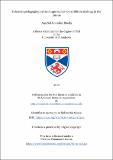Files in this item
Inherent pedagogies : critical approaches to exhibition making in the 2000s
Item metadata
| dc.contributor.advisor | Brown, Karen | |
| dc.contributor.advisor | Spencer, Catherine | |
| dc.contributor.author | González Rueda, Ana Sol | |
| dc.coverage.spatial | v, 272, [10] p. | en_US |
| dc.date.accessioned | 2019-03-15T12:50:52Z | |
| dc.date.available | 2019-03-15T12:50:52Z | |
| dc.date.issued | 2019-06-27 | |
| dc.identifier.uri | https://hdl.handle.net/10023/17293 | |
| dc.description.abstract | Since 2010, the discussion about the relation between curating and education has revolved around Paul O’Neill and Mick Wilson’s proposition of the ‘educational turn’. This term mainly refers to the shift from the peripheral, supportive part of educational activities in relation to exhibitions, to their increased centrality within contemporary curatorial practice. While expressly educational initiatives have received plenty of attention, this thesis concentrates on the inherent pedagogies of the contemporary art exhibition space. The research draws attention to this aspect, particularly regarding critical curatorial approaches that seek to contest prevailing neoliberal educational and cultural policy across Europe. The thesis contributes to exhibition histories in its examination of four chapter-long case studies that were selected on the basis that they propose other modes of spectatorship to the prevalent model of entertained consumption. It also makes a contribution to curatorial studies by delving into distinct critical approaches and integrating interviews conducted with the curators in each case. Most importantly, this study presents the potential of educational theory to both examine and rethink the positions and relations exhibitions organise between institutions, curators, artworks, and the public. Specifically, I put forward the potential contribution of posthumanist, feminist materialist, and decolonial pedagogies to current curatorial practice. These particular methods are supportive of the challenge to Western, modern epistemology set out across the chapters through boundary crossings such as aesthetic experience/discourse, mind/ body, artwork/viewer, the self/the other. I argue that, as curators, we need to unlearn the established —but largely unacknowledged— educational conventions of the field, explore other ways of learning, and set about unschooling contemporary art exhibitions. | en_US |
| dc.language.iso | en | en_US |
| dc.publisher | University of St Andrews | |
| dc.rights | Attribution-NonCommercial-NoDerivatives 4.0 International | * |
| dc.rights.uri | http://creativecommons.org/licenses/by-nc-nd/4.0/ | * |
| dc.subject | Curating | en_US |
| dc.subject | Education | en_US |
| dc.subject | Pedagogy | en_US |
| dc.subject | Exhibition making | en_US |
| dc.subject | Contemporary art | en_US |
| dc.subject | Mediation | en_US |
| dc.subject | Unlearning | en_US |
| dc.subject | Posthumanist pedagogy | en_US |
| dc.subject | Feminist materialist pedagogy | en_US |
| dc.subject | Decolonial pedagogy | en_US |
| dc.subject | Unschooling exhibitions | en_US |
| dc.subject.lcc | N4396.G7 | |
| dc.subject.lcsh | Art--Exhibitions--Educational aspects | en |
| dc.subject.lcsh | Art museums--Educational aspects | en |
| dc.subject.lcsh | Art museums--Curatorship | en |
| dc.title | Inherent pedagogies : critical approaches to exhibition making in the 2000s | en_US |
| dc.type | Thesis | en_US |
| dc.contributor.sponsor | Consejo Nacional de Ciencia y Tecnología (CONACyT) (Mexico) | en_US |
| dc.contributor.sponsor | Fundación Jumex Arte Contemporáneo | en_US |
| dc.type.qualificationlevel | Doctoral | en_US |
| dc.type.qualificationname | PhD Doctor of Philosophy | en_US |
| dc.publisher.institution | The University of St Andrews | en_US |
| dc.rights.embargoreason | Embargo period has ended, thesis made available in accordance with University regulations | en |
| dc.identifier.doi | https://doi.org/10.17630/10023-17293 |
The following licence files are associated with this item:
This item appears in the following Collection(s)
Except where otherwise noted within the work, this item's licence for re-use is described as Attribution-NonCommercial-NoDerivatives 4.0 International
Items in the St Andrews Research Repository are protected by copyright, with all rights reserved, unless otherwise indicated.


